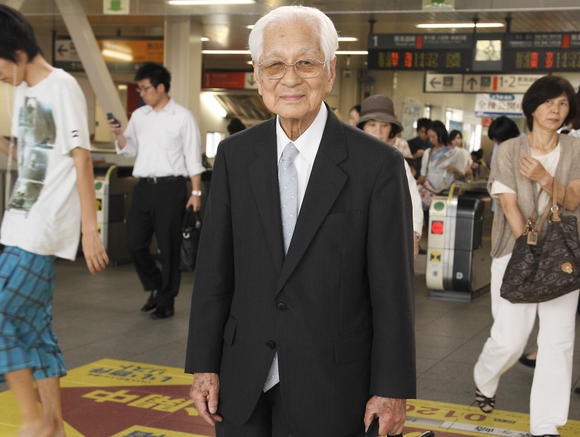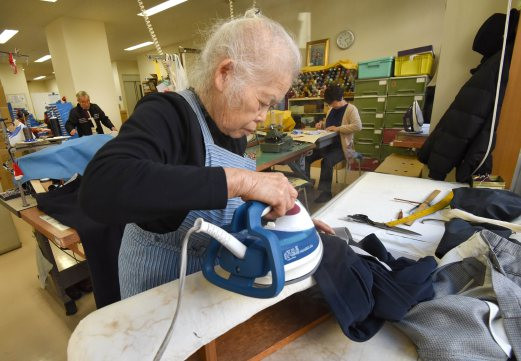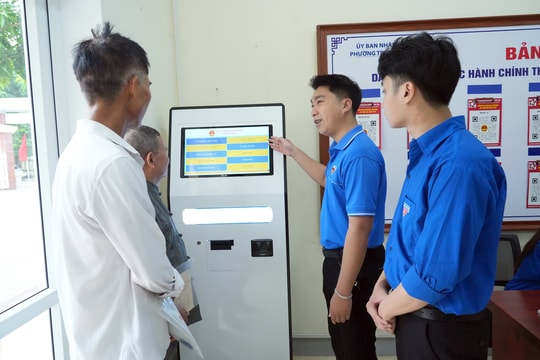Japanese people work until old age, Vietnamese people just want to retire early
An old man who worked until he was 101 years old before retiring is a story worth pondering about the spirit of the Japanese. For many elderly people in Japan, work is not a burden but on the contrary, it is a pride and joy in life. Meanwhile, in Vietnam, many people just want to retire early.
Mr. Fukutaro Fukui, now 104 years old, only actually retired 3 years ago, at the age of 101. A former head of a securities company, after retiring at the age of 70, Mr. Fukui continued a new job at the Tokyo Takara Shokai lottery brokerage company. At this age, most elderly people in Japan should have retired.
For 31 years, he continued to work hard. Every day, he took the train for about an hour to get to work in central Tokyo. It was not until he was 101, three years ago, that Mr. Fukui officially retired.
At the ripe old age of 100 years, Mr. Fukutaro Fukui is honored as the most famous salaryman in the land of the rising sun. He is currently living his last months at a nursing home in Chigasaki city, a suburb of Tokyo.
 |
| The 100-year-old man is still passionate about his work. (Photo: Nikkei) |
Mr. Fukui said that working motivates him, it is ingrained in him, money is not an important factor for him. “I work just because it is my instinct. What we achieve or whether we get promoted or not, that is not the important issue,” he added.
During his 30 years working at the lottery company, he was still enthusiastic about his work, but it was not very interesting because it involved checking money and lottery tickets. However, he was still quite satisfied. He shared: "Sometimes I took the stairs to go to the office, carrying a suitcase containing thousands of lottery tickets, I even walked faster than young people."
The reason Fukui stayed with the job for 31 years was because he was very close to the head of the lottery company, who was also his friend from his time studying economics at Tokyo University. As students, the two dreamed of becoming economic researchers, but World War II prevented them from achieving their dreams. He enlisted and served in the army.
After returning from the army, he realized that there were too many PhDs, and he was too far behind. He joined a small stock exchange founded by his best friend.
Mr. Fukui had intended to retire at the age of 96. But the wife of the securities company's leader asked his daughter to persuade Fukui to continue working. Because of his loyalty to his best friend, he continued working at that company even after his wife passed away.
His eldest daughter-in-law often drove him to the station and picked him up after work every day, until Fukui officially retired.
 |
| The elderly in Japan are always self-reliant. |
He wrote a book about his life titled: “At 100: People are always needed”. The book was published in Japan and has been translated and sold in Indonesia, Korea and Taiwan.
Work is fun
Fukutaro Fukui's story has become a role model for workers in Japan as the country's population ages. Many elderly Japanese people are now returning to work after retirement.
Not only Fukutaro Fukui, Mr. Kenji Wada, a 73-year-old lawyer also shared: "Money is secondary. The most important thing is to do something useful for society." For the past 40 years, Mr. Wada has always been passionate about his profession and has worked for many companies.
According to a recent study by the Japanese labor agency, 82% of Japanese companies renew their contracts with employees after they retire. Currently, the number of employees over 65 has reached 6.81 million.
The Japanese government has passed a law requiring businesses to allow workers to work until age 65 and to begin implementing the 65 retirement rule from 2025.
Extending work hours is a way to feel useful, said Shigeru Oki, director of the Business Policy Forum, a government-funded organization. The organization’s research shows that older people want to work to stay connected to society and maintain their health.
According to Mr. Oki, the elderly in Japan feel that the pension system has become a burden for the younger generation due to the falling birth rate, so they may accept postponing pension payments until age 65.
In Singapore, all the simple jobs like pulling trolleys, cleaning toilets, cleaning toilets are done by men and women aged 65-75. Taxis are mostly driven by grey-haired men aged 65-75. In the city, all the garbage collectors and cleaners are done by women aged 65-75. As for Vietnamese people, women aged 55 and men aged 60 have retired and retired do not work.
Meanwhile in Vietnam, the retirement age is 55 for women and 60 for men.
Two years ago, the draft revised Law on Social Insurance proposed that from 2016 onwards the retirement age for female cadres, civil servants and public employees would be increased (from 55 to 60 years old for women and from 60 to 62 years old for men); from 2020 onwards the retirement age would be increased for the remaining groups, increasing by 4 months each year until reaching 60 years old for women and 62 years old for men.
However, this draft has caused much controversy and has not yet been implemented.
According to the analysis of FPT Deputy General Director Do Cao Bao, one of the four inherent weaknesses that hinder development and keep Vietnamese people poor is "laziness and complacency". Mr. Do Cao Bao believes that Vietnamese people are very interested in "enjoying the countryside", "gathering with their children and grandchildren" and "being old at 60".
In the trend of increasing human life expectancy, most countries have raised the retirement age (USA 67 years old, Japan 68 years old, France 62 years old). Vietnam still keeps the working age as it was 62 years ago - when life expectancy was 10 years lower than now - which is a burden on the pension fund and the State Budget.
According to VNN
| RELATED NEWS |
|---|








